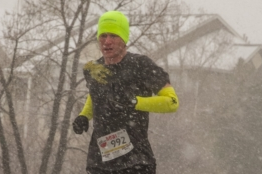Shortly after the conclusion of this year’s London Marathon my daughter asked me, “Who’s a faster runner, Bolt or Kipchoge?” She was referring to Usain Bolt, arguably the greatest sprinter of all time , and Eliud Kipchoge, the greatest marathoner of all time. This is an interesting question and not one that’s easily, or maybe possibly, answered.
In a previous post, I discussed how sprints are very different from distance races. You don’t see athletes switching between them during their careers because of the significantly different styles of training and racing. To answer the question of who’s faster, you couldn’t have Bolt and Kipchoge meet in the middle by setting up a half-marathon showdown. Kipchoge would dominate it. You might be able to use a 600M race but since neither man specializes at that distance, it wouldn’t be a fair comparison either.
Another possibility is to look at how they dominated their respective distances. Bolt won the 100M and 200M gold medals at three straight Olympic games starting in 2008. This was unprecedented and no other Olympic sprinter, male or female, has come close to this mark. He owns a variety of world records but the two most prominent are the 100M at 9.58 seconds and 200M at 19.19 seconds. Though he lowered these records multiple times, his final ones stand at 1.6% and .006% faster, respectively, than the ones he initially broke.
Kipchoge has won 12 out of 13 marathons he’s entered and has a current winning streak of eleven. These victories include eight majors, Olympic gold in 2016, and a world record of 2:01:39, which is 1.05% faster than the prior mark. He owns the fastest unofficial time of 2:00:25, as well as the third and sixth fastest official times ever, and has defeated all of the other current top marathon performers head-to-head.
Bolt and Kipchoge’s performances at high-level races is exceptional and they’ve made it look almost easy. During a replay of the 100M final at the 2016 Olympics, the commentators slowed down the footage and pointed out Bolt turning and smiling at the camera. That is nearly unfathomable at that distance and it shows how confident he was he would win. In the 2018 Berlin Marathon and 2019 London Marathon, Kipchoge could be seen directing the other pacers and runners during the race in an effort to keep the speed up. When he’s finished his last several races, he has enough left over to enjoy the crowd in the final stretch. What does all this mean? They’re not barely getting over the line in front of everyone else, they’re winning comfortably.
So who is the faster runner? Given how far they’ve been ahead of their competitors, I’m going to call it a tie, something neither one is used to but which seems appropriate.
Running food review of the week: (note–gels, bars, chews, and other items affect everyone differently. Try them on a short run before using them for a key training run or race): Clif Bar Fruit Smoothie Filled Blueberry Acai: This seemed like it had potential but it wasn’t much different than a standard Clif Bar. The interior was still very chewy. I liked it, it tasted like Blueberry, and it had good energy, but if they’re more expensive than the traditional Clif bars (and I forgot to check the price comparison) I wouldn’t see any reason to pay more for them.
Sources used:
https://en.wikipedia.org/wiki/100_metres
https://en.wikipedia.org/wiki/200_metres
https://en.wikipedia.org/wiki/Eliud_Kipchoge
https://en.wikipedia.org/wiki/Marathon
https://en.wikipedia.org/wiki/Usain_Bolt

Running anecdotes, running food reviews, some race coverage, and more